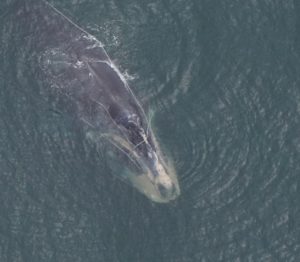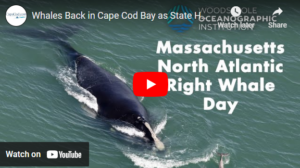
North Atlantic right whale “Snow Cone” (Catalog #3560) spotted south of Nantucket on Sept. 21, 2022, dragging heavy fishing gear and in poor health. CREDIT: New England Aquarium, taken under NOAA permit #25739
NANTUCKET – Marine animal experts say the fishing industry needs to transition to ropeless fishing gear—also called on-demand gear—as endangered whales like routine Cape and Islands region visitor “Snow Cone” continue to become entangled.
The entanglement is the sixth for Snow Cone. New England Aquarium scientists said that considering her injuries, she is unlikely to survive.
Dr. Sarah Sharp, veterinarian with the International Fund for Animal Welfare, said the whale likely is suffering from a bone infection as the ropes dig into its mouth—a common problem during entanglements.
“We have also seen entanglements and lines around pectoral flippers cause partial amputations and cause appendages to become necrotic. These are really painful, horrible experiences for these whales that can go on for months and sometimes years,” said Sharp.
She added that whale entanglements require action from organizations like the Center for Coastal Studies, which is not without safety risk for staff.
“These whales that are 50 tons when they’re adults can cause massive damage to people, even if they’re trying to help them. These whales don’t understand that we’re trying to assist them, they just know that they have rope on them, that it’s causing them injury and it’s painful. So they unfortunately see the rescuers oftentimes as threats to them,” said Sharp.
She said that the whales are also spending more and more time in the region’s waters as climate change continues to warm the oceans, meaning more overlap with fishing areas where they were previously a rare sight.
New federal regulations meant to protect the whales have seen pushback by the state of Maine and fishing groups, who say there is not enough data on the industry’s impact on marine animals and that the rules are too strict.
Center for Coastal Studies Director of Marine Animal Entanglement Response Scott Landry previously told CapeCod.com that they are investigating all disentanglement options.























